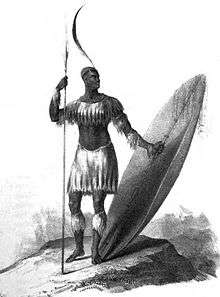
I need no bodyguard at all, for even the bravest men who approach me get weak at the knees and their hearts turn to water, whilst their heads become giddy and incapable of thinking as the sweat of fear paralyzes them.
Shaka kaSenzangakhona (c. 1787 – c. 22 September 1828), also known as Shaka Zulu [also spelled Tshaka, Tchaka or Chaka], was the most influential leader of the Zulu Kingdom.
Quotes
- Strike an enemy once and for all. Let him cease to exist as a tribe or he will live to fly in your throat again.
- Advice to King Dingiswayo on the treatment of the defeated Ndwandwe, reported in Shaka Zulu : The Rise of the Zulu Empire (1955) by E. A. Ritter, p. 50
- Up! children of Zulu, your day has come. Up! And destroy them all.
- While battling the Ndwandwe, reported in Shaka Zulu : The Rise of the Zulu Empire (1955) by E. A. Ritter, p. 179
- I need no bodyguard at all, for even the bravest men who approach me get weak at the knees and their hearts turn to water, whilst their heads become giddy and incapable of thinking as the sweat of fear paralyzes them. They know no other will except that of their King, who is something above, and below, this earth.
- Following his mother's death, as reported in Shaka Zulu : The Rise of the Zulu Empire (1955) by E. A. Ritter, p. 319
- Women that bear children must exist in Zululand only.
- Statement advocating genocidal policies against tribes which opposed his conquests, as reported in Lessons on Leadership by Terror : Finding Shaka Zulu in the Attic (2005) by Manfred F.R. Kets de Vries, p. 40
Quotes about Shaka
- The Shaka story … has a Faustian quality. A tale of temptation, it asks what price a person is willing to pay, how far he is willing to go, to obtain power. In revealing Shaka's heart of darkness, it reveals the dangerous consequences of closing a pact with the devil: hubris, violence, death. And it warns of the presence of these destructive forces in all of us. Shaka is himself in this story, but he also represents the darker, shadow side of humankind generally. We see ourselves when we watch him become so obsessed by power that he sacrifices human relationships for what the devil (in the person of malevolent diviners and witchdoctors) can offer him, and when he loses the ability to distinguish between killing for a just cause and wanton killing for killing's sake. The ending is predictable, surely: loneliness and despair. Shaka ends up on a throne of blood, isolated from his fellow human beings, struggling with depression and despondency.
- Manfred F.R. Kets de Vries, in Lessons on Leadership by Terror : Finding Shaka Zulu in the Attic (2005), p. 59
External links
This article is issued from
Wikiquote.
The text is licensed under Creative
Commons - Attribution - Sharealike.
Additional terms may apply for the media files.